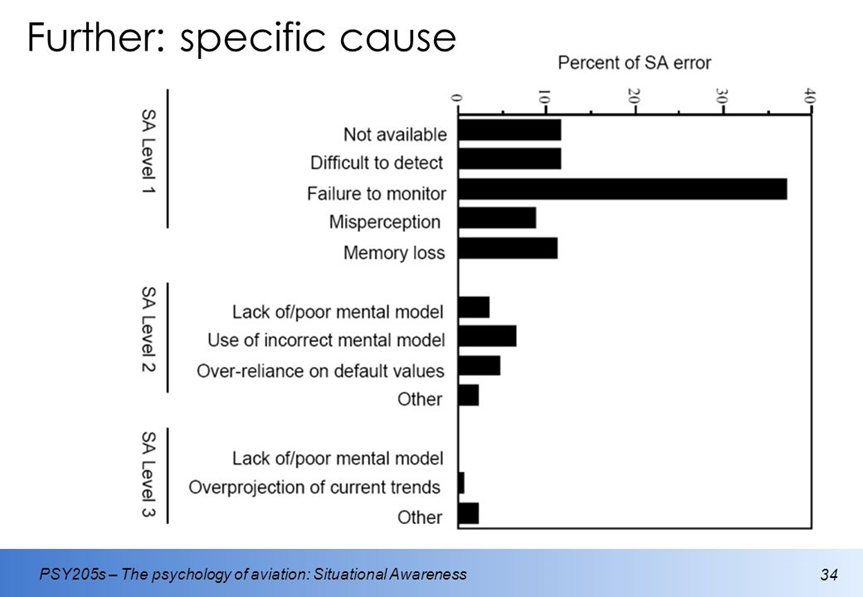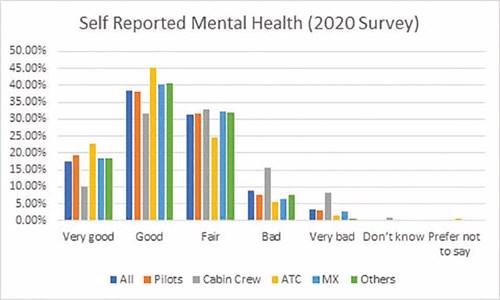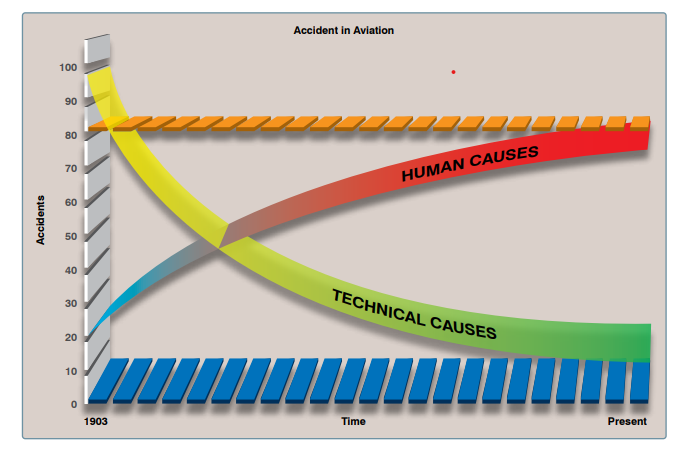Abstract
Commercial airline pilots are in charge of the safe transportation of thousands of passengers daily; thus, they must be in good physical and mental health to do their jobs. Airlines, regulators, and customers are very concerned about the psychological issues that pilots experience. Deteriorating mental health can have tragic results, as was the case with the recent murder-suicide on board a German wings aircraft from L’Aquila to Hospitalet. An “aviation psychology” branch focuses on applying psychological concepts and methods to studying aviation medicine. Aviation psychology is the application of human factors psychology, clinical and counseling psychology, and aviation medicine to the practice of treatment for the aerospace sector. The study aims to describe how aviation psychology affects the performance of pilots and flight crews.
Introduction
The growth of aviation medicine and work psychology coincided with the advent of aviation psychology around the turn of the century. The very particular character of the thought processes involved in flight led to the creation of aviation psychology as a separate field of study. Flight psychology first concentrated on the choice of pilots in the early days of aviation (Boyd et al., 2020). But as technology has advanced and flight has increased in the commercial, military, and general aviation sectors, the function of the aviation psychologist, has also grown. Today’s aviation or aeromedical psychologists work on accident investigations, mental illnesses, the choice and instruction of flight crew, upkeep of mental health, fitness-for-duty assessments, and the medical certification of pilots. This particularity is primarily because man’s separation from the earth causes a significant change in the structure of spatial orientation and the appearance of considerable mental stress.
The essential principles underlying human existence and psychological ideas, such as psychological stability, equality, and liberty, are values that aviation psychology finds challenging to respect. As a result, individuals must treat pilots and flight crews equally in every part of their everyday lives. It can be the fundamental idea about psychological adjustment and behavioral growth. This idea’s importance in various professions and other practices within the aviation industry is still inevitable. For this reason, it is essential to describe how aviation psychology affects the performance of pilots and flight crews to increase flight safety.
Development of Aviation Psychology
In many aspects, aviation psychology and aviation safety are related. Aviation psychology was first developed in the 1940s (during World War II) to ensure the safety of fighter planes (Boyd et al., 2020). Aviation psychology is most useful when fighter jets are being flown ferociously in combat situations (Enos, 2022). To improve their performance, such vessel pilots require ongoing psychological care. The Tenerife incident on March 27, 1977, is one of the fatal aircraft mishaps that sparked advances in aviation psychological safety (Boyd et al., 2020). It was one of the accidents with the highest number of deaths. When a KLM Boeing 747 attempted to take off without sufficient permission, the disaster resulted in the immediate deaths of 583 persons (Boyd et al., 2020). Then, at Tenerife Island’s Los Rodeos Airport, it slammed violently with a Pan Am 747, instantly killing several people. The pilot’s fault is held responsible for the entire situation, which emotional instability, anxiety, or mental health issues may have caused. Clinical evidence supports the idea that aviation psychology is an essential component of the medical community.
Recognizing the pilot’s cognitive demands, capacities, and limitations significantly affects pilot selection, training, and cockpit display design. N. M. Dobrotvorskii, S. E. Mints, and K. K. Platonov’s studies and contributions led to the active development of aviation psychology in the Union of Soviet Socialist Republics (USSR) beginning in 1921(Enos, 2022). Aviation psychology study is now being developed within the larger field of engineering psychology. The preliminary results in aviation psychology amidst the second half of the 20th century have been on the impact of flying elements on mental functioning and the creation of safeguards against adverse effects (Gattupalli, 2022). The goal of studying piloting is to uncover psychological factors contributing to aviation accidents and maximize technological adaption. Additionally, the study of mental attributes helps specialized aviation jobs improve psychological training and character principles for the effective execution of flying duties.
The branch of psychology known as aviation psychology is quite specialized. The study of the psychological issues associated with flying is a subfield of psychology, as outlined in figure 1. It is utilized by government organizations, airports, and airlines to improve workplace safety. The role of an aviation psychologist may include candidate screening for flying training or aiding in the reconstruction of prior occurrences. Aviation psychology aims to promote and support safe flights by studying the psychological behaviors of pilots and flight crews (Enos, 2022). Pilots and flight crews need to be psychologically prepared to avoid any psychological issues affecting how effectively they perform during a flight.
Psychological stability and wellness are essential components of safe flight. Psychologists in this discipline will use their knowledge of human behavior to assess the well-being of potential pilots by checking for conditions including bipolar disorder, personality disorder,s various anxiety disorders, and depression. For effective flying missions, it is crucial to state that an aviation psychologist must be knowledgeable in psychology and aviation. Due to the high-stress levels in the aviation business, aviation psychologists frequently offer mental health services to the flight crew and other airline or airport staff, including advice on eating well and managing jet lag. So as to improve flight safety, it is essential to clarify how aviation psychology affects the performance of pilots and flight crews.

The Contributions of Aviation Safety Discipline to Understanding Psychology
There are several ways in which aviation psychology and aviation safety are intertwined. First, the importance of psychological stability in their line of work should be recognized by aviation psychologists. Professionals may operate without preconceptions based on incompetence when they know the situations among various pilots. One can see that an aviation psychologist’s capacity to make illogical decisions is limited while working with multiple clients with varying aviation backgrounds. Aviation psychologists have considered several aspects while working with clients because of psychological torments and obstacles, including the client’s problems, self-beliefs, and flying cultures (Kanka & Schwarz, 2022). It has made numerous contributions to aviation psychology.
Identifying Mental Issues of Pilots
There are several mental health problems that pilots and the people who assist them deal with while flying, as shown in figure 2. However, these psychological problems stem from worries about upcoming encounters and previous adverse events. Therefore, the psychological issues that must be addressed among the concerned groups are disorders like Obsessive-Compulsive Disorder, hallucinations, Attention Deficit Hyperactivity Disorder (ADHD), and Schizophrenia (Gattupalli, 2022). Specifically, difficulties with belief systems, language use, and reality perception are factors in the majority of psychological problems experienced by pilots. In addition, according to aviation psychology, competency issues during flight may arise at various times. Notably, the ability to manage stress is crucial for flying safety. Therefore, through aviation psychology, psychologists may assist all crew members, from pilots to air traffic controllers, by educating them on how to deal with stress, so they do not suffer weariness and exhibit subpar performance.
The aviation sector faces more potential difficulties due to changing technology and the growing requirement for mental stability. The current generation of aviation psychologists must deal with several problems that negatively influence the development and well-being of pilots, flight crews, and other flight controllers. The safety of this crew should come first if safe flights are necessary. They understand the relevant flying benefit taken advantage of in this situation (Kanka & Schwarz, 2022). Counseling flight crews is specifically a prospective modern topic in aviation psychology. The primary responsibility of most aviation psychologists is to identify, treat, and correct any mental flaws in aspiring pilots.
Accident counseling is a significant component of aviation psychology. The survivors of any air crush often need counseling to regain their mental equilibrium. Aviation psychologists advise pilots and other crew members to ensure their complete recovery before returning to work. This clause is crucial in psychological improvement following any traumatic occurrence. After a catastrophic event, it’s essential to overcome the anxiety of returning to work (Keller et al., 2022). This is a basic need that aviation psychologists can only meet. Preventing the entire flight crew from overreacting is crucial. Because of this, it has been widely accepted that the existing counseling measures are successful when coupled with appropriate rehabilitative practices.
Aviation psychology is used to identify psychological issues in aviation personnel and offer prompt care. For example, an aviation psychologist will evaluate the flight crew using psychological tests and interviews before the flight. As a result, they could determine the flight crew’s psychological state at the time and offer any necessary therapies, such as mental health and wellness services. To guarantee a safe flight, they will also establish whether the pilot is stressed out or if there are any other issues (Keller et al., 2022). If so, they will quickly handle the situation and find a replacement pilot. As a result, they can prevent flight crew members with psychiatric problems from flying in the air and perhaps causing an aviation accident.

Analyzing and Understanding Human Behavior
Aviation psychology aids in the analysis and comprehension of human behavior. Through study, it has been discovered that more than 70% of commercial aviation hull-loss incidents had a human element or human mistake as a critical driver (Ragan et al., 2017). Since the retail aviation sector learned that human errors cause most aircraft accidents and incidents rather than mechanical breakdowns, as indicated in figure 3, the term “human factors” has become more popular. The study of human factors in aviation focuses on determining the safest and most effective ways to integrate humans and technology to improve human performance. Then, design, rules, and processes are created using this understanding. In aviation, technological advancement continues to outpace human capacity (Pacheco & De Moraes Garcia, 2020). Instead, a new wing must be developed using sound aerodynamic engineering centered on flight deck design. It helps improve human performance while addressing their inherent constraints by influencing the design of Boeing airplanes. Specialists in human factors contribute to analyzing operational safety and creating tools that can assist operators in better managing human error. Some responsibilities include designing for maintainability, managing errors, and addressing human issues in flight deck design.

Human factors, particularly human mistakes, are responsible for more aviation mishaps and tragedies; hence, psychology is critical in solving them. For instance, an Excalibur Airways Airbus 320 showed an unintentional roll to the right when it left London-Gatwick Airport (LGW) on August 26, 1993(Pacheco & De Moraes Garcia, 2020). This behavior remained until the plane returned to LGW 37 minutes later. The loss of spoiler control compromised the flight control system and necessitated the constant use of a large amount of the left sidestick for aircraft control (Ragan et al., 2017). The Airbus spoilers were improperly locked out during the flap change work performed the day before the flight by technicians experienced with Boeing 757 flap change procedures. The issue was made worse by the next shift’s technicians’ turnover. The 320 was considered similar to the 757; hence wrong spoiler lockout technique was not included (Ragan et al., 2017). The flight crew performed a functional operational check after changing the flaps; however, they failed to notice the erroneously locked-out spoiler. One of the main contributing factors to this disaster was a lack of understanding of Airbus protocols.
Provide a Non-Judgmental Psychological Support to Staff and Family
Aviation psychology helps to offer personnel and their families, whenever necessary non-judgmental psychological counseling. The business world is developing and changing quickly. It is modernizing to the point that staff cannot handle the strain, ultimately depleting them. Whether personal, professional or family, crisis staff members can turn to the employee assistance program (EAP) for support. (Pacheco & De Moraes Garcia, 2020). EAP aims to provide brief interventions to the affected employees and their families. In addition, EAP assists workers in resolving issues that influence their employment. It is a program for counseling and consultation where employees present the problems they are having. And in return, professionals offer the appropriate set of solutions. As a result, employee psychology is aided, and employee engagement levels are raised over time.
Profiling Pilots and Assessing Suitability to Airline
The human aspect is becoming increasingly significant in modern aviation. Because of this, it is even more crucial to consider the human element when choosing pilots. Aviation mishaps may be attributed to human factors in about 70–80% of cases (Ragan et al., 2017). Hence profiling pilots is essential to ensuring that all pilots and flight crews are adequately trained and prepared before they take their first flight (Sagan et al., 2022). Pilots must make the appropriate choice, especially under duress or in emergencies. Using the psychological exams from SCHUHFRIED and the SAAIR test set, one may assess an applicant’s fitness more quickly (Yu et al., 2022). The SAAIR exam set consists of performance and personality assessments and is a collection of standardized aptitude tests for pilots. It addresses personality and cognitive performance issues that are pertinent to flight safety. High cognitive performance is necessary for handling stressful conditions in aviation.
The study of aviation psychology is frequently utilized to aid in the hiring and training of aircrew. Professional airline pilots are continually assessed throughout their careers to ensure they are physically fit to fly. Few occupational groups are scrutinized to the same extent as airline pilots, and the evaluation process starts even before the candidates are hired. To determine whether a candidate for training or employment with an airline has the necessary cognitive abilities, flying ability, and other competencies, they must undertake a battery of tests, including psychological evaluations (Schwarz, 2019). Therefore, psychologists in this sector frequently use aviation psychology to assess the psychological and mental health of the flight crew.
The evaluation’s elements included mental health conditions, including stress, sadness, anxiety, and personality disorders. Aviation psychologists have also implemented training programs to improve memory, concentration, perception, and communication among the flight crew (Sagan et al., 2022). For instance, to address the psychological issues within the workforce, most flying companies have formed counseling sections with aviation psychologists. Effective policy creation and active research into the best practices for aviation transformation have also been launched to increase the number of safe flights. Most nations have implemented effective psychological techniques for pilots and flight crews to promote safer flights.
Conclusion
Aviation psychology is crucial to the lives of pilots and flight crews from a clinical perspective. There are several mental health difficulties that pilots and flight crews are dealing with, as well as effective therapies. An individual’s competency significantly impacts the caliber of their cognitive performance. According to clinical aviation psychology, comprehending what bothers people hinges on mental processes, known as cognitive processes. It highlights how people interpret information as a consequence. Additionally, it considers how knowledge is applied and how deeds trigger retaliation. Cognitive psychologists are more interested in the events between the stimuli’ incitements and the response it elicits. This clause is pertinent to aviation psychology when pilots and the flight crew are involved in psychological abnormalities.
References
Boyd, D. D., Scharf, M., & Cross, D. (2020). A comparison of general aviation accidents involving airline pilots and instrument-rated private pilots. Journal of Safety Research, 22(42). Web.
Enos, G. (2022). California pilots targeting the vulnerable overcame obstacles early in the pandemic. Mental Health Weekly, 32(5), 1–7. Web.
Gattupalli, R. (2022). Comparing reported safety behavior of safety major aviation students and non-safety major aviation students. Psychology and Behavioral Science International Journal, 18(5). Web.
Kanka, M., & Schwarz, M. (2022). 10th International summer school on aviation psychology. Aviation Psychology and Applied Human Factors, 12(1), 65–68. Web.
Keller, J., Mendonca, F. A. C., & Adjekum, D. K. (2022). Understanding factors underlying fatigue among collegiate aviation pilots in the United States. Safety, 8(2), 46. Web.
Pacheco, A., & De Moraes Garcia, A. C. (2020). Language issues of Brazilian pilots regarding structure: A comparative study between student pilots and SDEA test takers. The Especialist, 41(3). Web.
Ragan, A., Sommer, T., & Drews, F. (2017). A comparison of airline safety videos in information acquisition. Proceedings of the Human Factors and Ergonomics Society Annual Meeting, 61(1), 1671–1673. Web.
Sagan, A., Kowalska-Bobko, I., Biechowska, D., Rogala, M., & Gałązka-Sobotka, M. (2022). Implementation of mental health centers pilots in Poland since 2018: A chance to move towards community-based mental health services. International Journal of Environmental Research and Public Health, 19(9), 5774. Web.
Schwarz, M. (2019). Meeting report. Aviation Psychology and Applied Human Factors, 9(2), 114–117. Web.
Yu, F., Li, X., & Yang, J. (2022). Investigation of pilots’ mental health and analysis of influencing factors in China: based on structural equation model. BMC Public Health, 22(1). Web.
